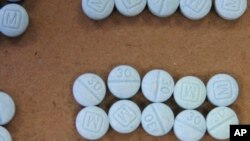A U.N. body on Thursday added two chemicals used to make the drug fentanyl, which killed music star Prince, to an international list of controlled substances, which the United States said would help fight a wave of deaths by overdose.
Fentanyl is a man-made opioid 100 times more powerful than morphine. Roughly 20,000 U.S. overdose deaths in 2015 involved heroin or synthetic opioids such as fentanyl, according to the U.S. Centers for Disease Control and Prevention.
An annual meeting of the Commission on Narcotic Drugs, which also acts as the governing body of the Vienna-based U.N. office on Drugs and Crime (UNODC), voted to "schedule" two fentanyl precursors and a fentanyl-like substance, meaning they would be added to an international control list.
Putting the chemicals on the control list ensures closer international monitoring of suspicious orders and transactions, which should make it harder for people aiming to produce fentanyl illegally to get hold of these chemicals.
"None of us lives under the illusion that this is a silver bullet to solving our opioid crisis," a U.S. State Department spokeswoman said in response to the decision.
"But this vote will make it harder for the criminals that are illicitly producing fentanyl to access the necessary resources. It will require countries to regulate the production, sale, and export of the precursors to fentanyl, and to criminalize sale or trafficking outside of those regulations."
The UNODC named the two precursors as 4-anilino-N-phenethylpiperidine (ANPP) and N-phenethyl-4-piperidone (NPP). A fentanyl analogue called butyrfentanyl, a drug similar to fentanyl, was also added, it said.
The State Department spokeswoman said they were the two leading chemicals used to illegally produce fentanyl in the United States.
United Nations and U.S. officials also emphasized that Thursday's decision was an example of effective action by the United Nations at a time when the Trump administration is aiming to slash funding for both the State Department and the United Nations.
"The U.S. mission [to the United Nations in Vienna] ... welcomes this decision as a concrete example of how international action can have a clear benefit for the United States, as we face a crisis taking a tremendous toll on American communities," it said in a statement.





